News
-
August 2025Presentation, with Amber Rynearson, at the Conference on Researching and Applying Metaphor:
Rynearson, A., R. Hashemi, V. Vekić Chen and M. Taboada (2025) A three-tier approach to comprehensive metaphor annotation. 17th Conference on Researching and Applying Metaphor. Southfield, MI, United States.
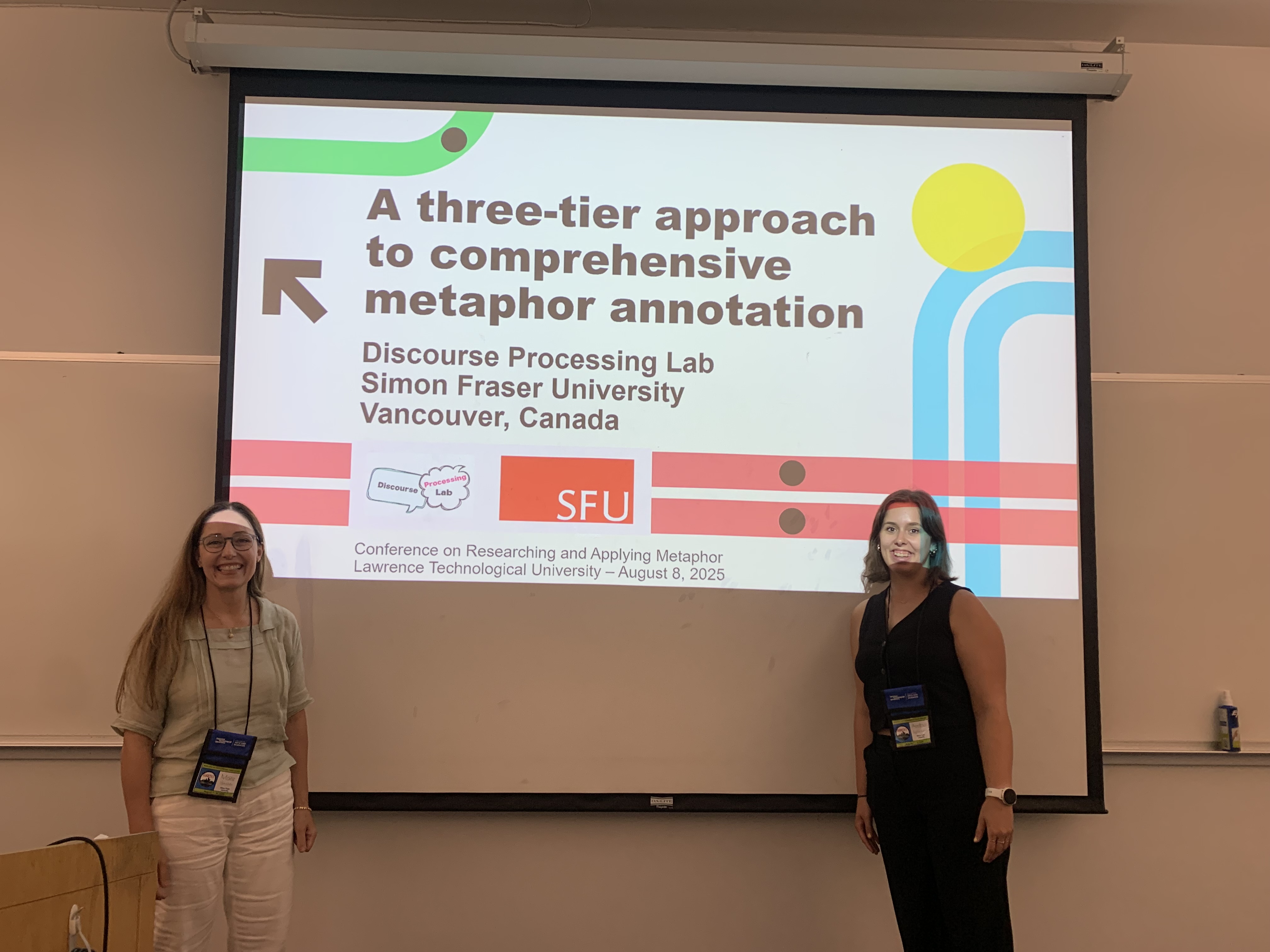
-
June 2025Two presentations at the 19th International Pragmatics Conference:
1. Bednarek, M. and M. Taboada (2025) "Attitude and quotation in news discourse: A corpus pragmatic investigation."
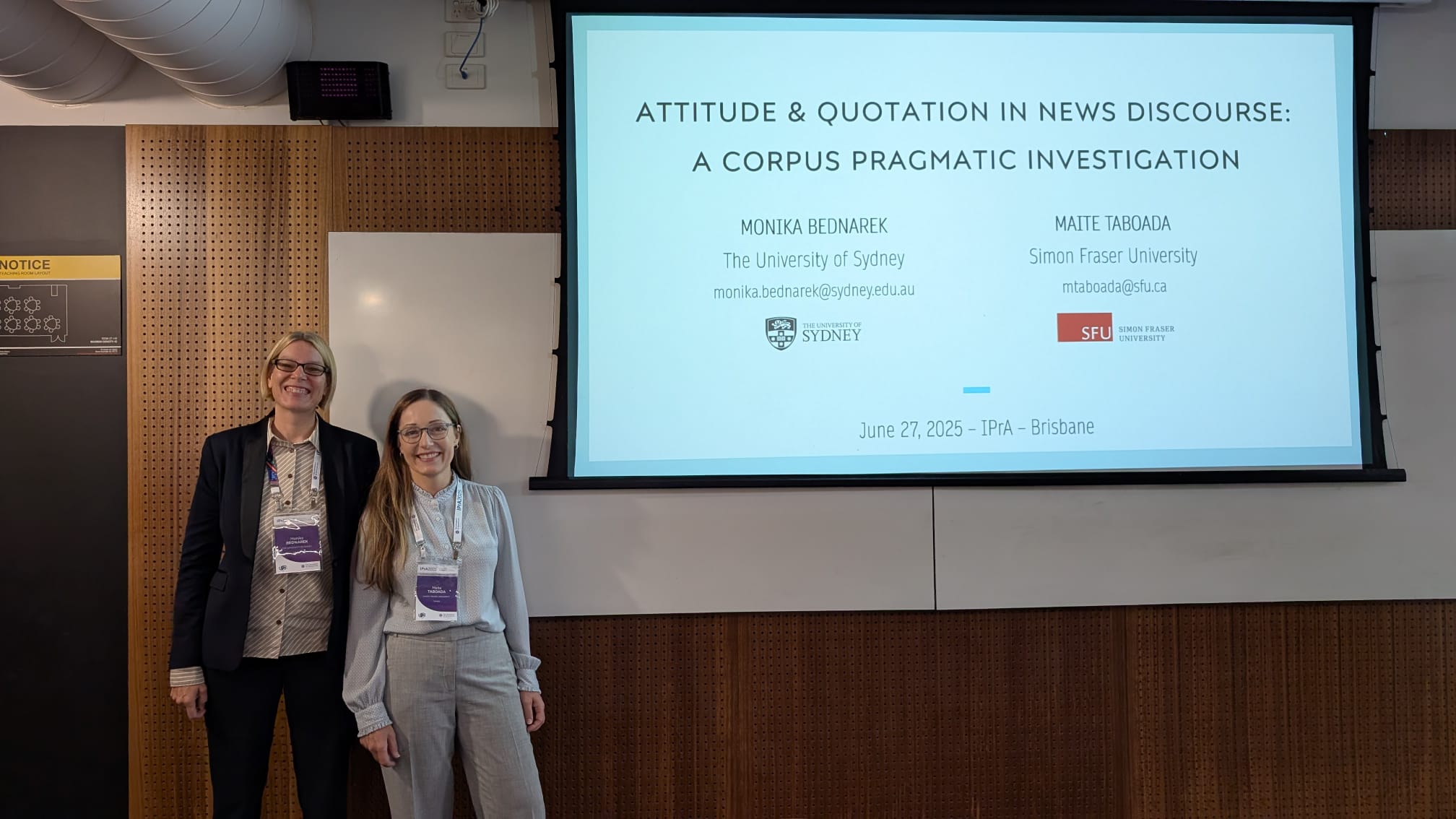
2. Bermúdez, M., I. da Cunha and M. Taboada (2025) "Choosing clear variants for English terms from the legal-administrative domain within the EU: A glossary proposal."
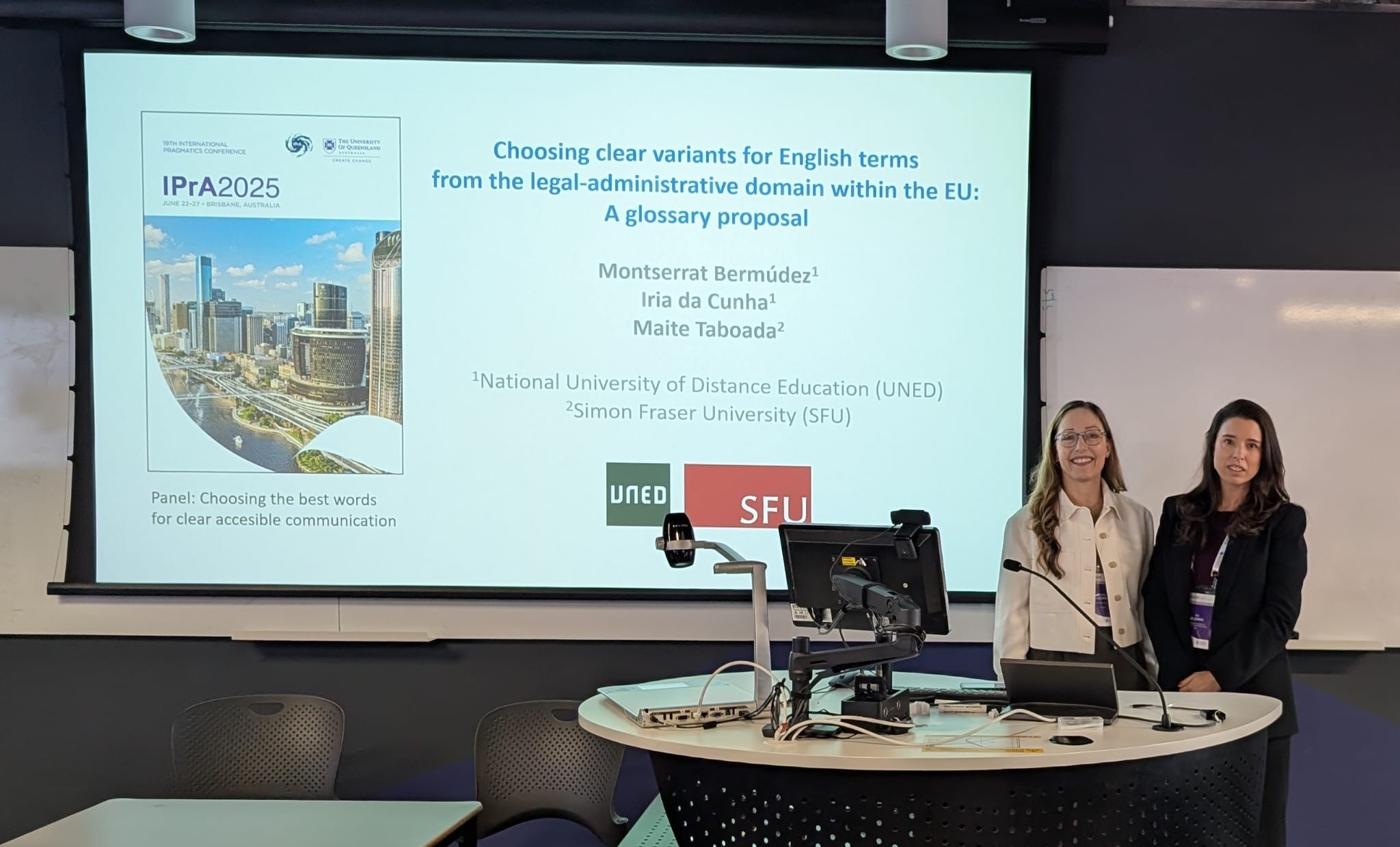
-
March 2025Keynote presentation at the Breaking BAIS conference in Munich: "Measuring gender bias using Natural Language Processing".

-
January 2025The Five Minute Linguist event at the meeting of the Linguistics Society of America. I had so much fun talking about the Gender Gap Tracker!

-
October 2024I attended the European Conference in AI in Santiago de Compostela and was interviewed about the lab's research on hate speech detection.
-
September 2024Paper on an interesting construction in English, which we dubbed the 'adverb-ly adjective' construction. This is the result of a long research process, which started in 2017 with 3 authors on 3 continents! Our wonderful communications officer, Nicole North, wrote a story about the research process.
- Taboada, M., C. Goddard and R. Trnavac (to appear) The 'adverb-ly adjective' construction in English: Meanings, distributions, and discourse functions. English Language and Linguistics.

-
May 2024Plenary talk about mis/disinformation from a linguistic point of view. Symposium organized by the University of Navarra (Spain).


-
February 2024I gave a plenary presentation at the conference of the German Linguistics Society(Deutsche Gesselschaft für Sprachwisschenschaft) on "Computational evaluation".
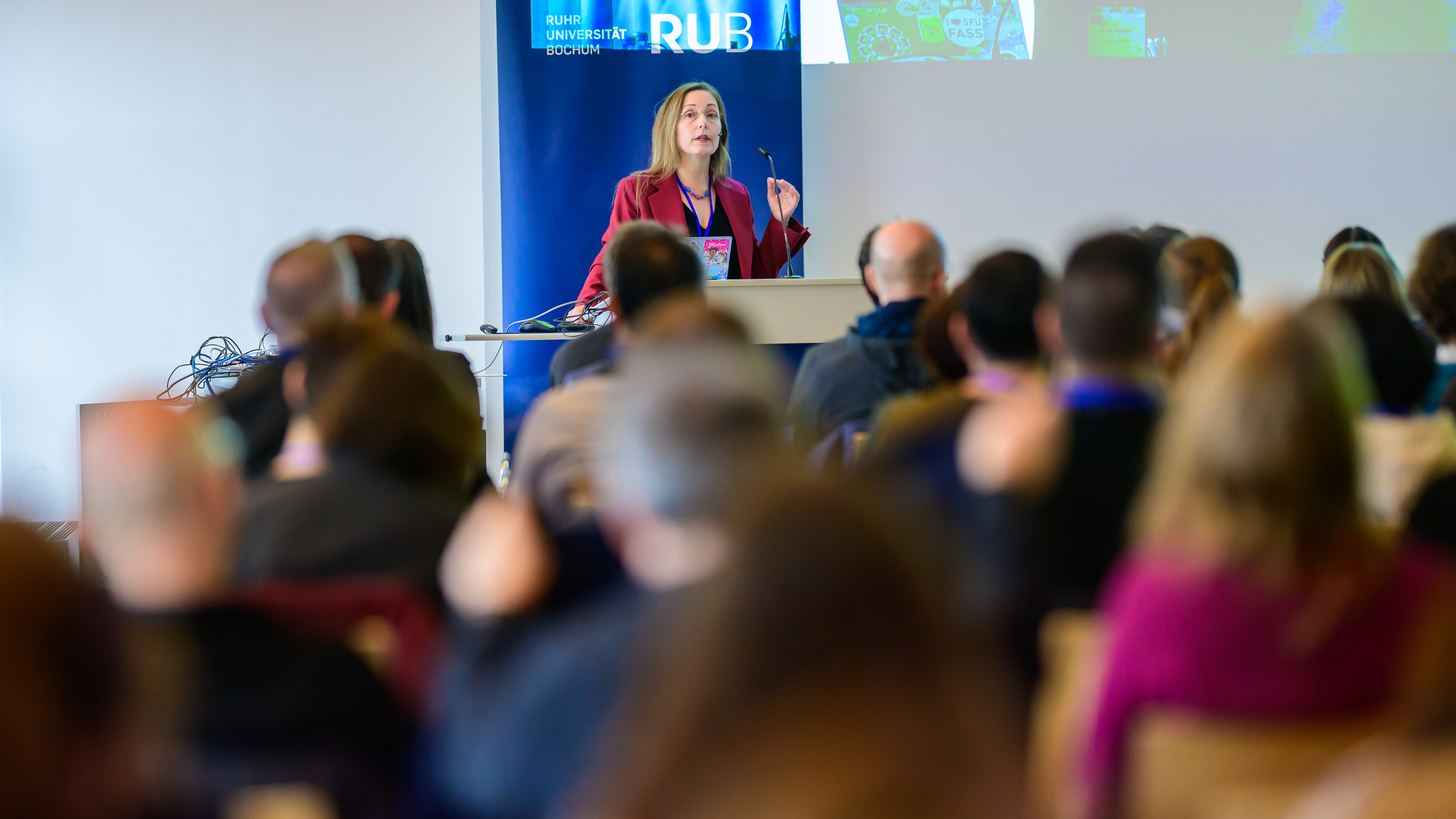
-
December 2023Our paper on data and methods to detect 'fake news' and misinformation just appeared in the Handbook of Discourse and Disinformation:
- Asr, F.T., M. Mokhtari and M. Taboada (2023) Misinformation detection in news text: Automatic methods and data limitations. In Maci, S., M. Demata, M. McGlashan and P. Seargeant (eds.) The Routledge Handbook of Discourse and Disinformation. Routledge. 79-102. -
November 2023Paper accepted! Work with the Digital Democracies Institute on conflict in online conversations:
- Canute, M., M. Jin, h. holtzclaw, A. Lusoli, P. Adams, M. Pandya, M. Taboada, D. Maynard, W. Chun (2023) Dimensions of online conflict: Toward modeling agonism. Findings of the Conference on Empirical Methods in Natural Language Processing. Singapore. December 2023. Also available on ArXiv. -
September 2023Katharina Ehret and I were interviewed by Robbie Love, of the wonderful CorpusCast:
- "Fake news with Prof. Maite Taboada and Dr. Katharina Ehret". CorpusCast. Online. -
June 2023NEW! Paper on the Radar de Parité, a tool to analyze gender representation in French news stories:
- Soumah, V-G., P. Rao, P. Eibl and M. Taboada (2023) Radar de Parité: An NLP system to measure gender representation in French news stories. Proceedings of the 36th Canadian Conference on Artificial Intelligence. Montréal. Jun 2023.
We are presenting the research behind the Radar de Parité this week @CanadianAi @c_a_i_a_c in Montréal!!
— Maite Taboada (@maite_taboada) June 6, 2023
Check out the full paper to find out why we think large language models won't solve all NLP problems 🤯https://t.co/4m3rsEqbqr https://t.co/RrKqghslRg -
April 2023I gave a talk on the Gender Gap Tracker at the online series organized by the Spanish Society for NLP. Video is available:
- "Procesamiento del Lenguaje Natural para eliminar la brecha de género en los medios de comunicación" -
January 2023I have been interviewed by several Spanish media about my research on toxicity online.
- La libertad de expresión no quiere decir libertad para ofender, El Confidencial
- Desde la entrada de Elon Musk en Twitter hay menos moderación de contenido y más basura, El Mundo
- ¡Cuidado! El odio es muy contagioso, El Periódico de Catalunya -
September 2022I am a newly elected Fellow of the Royal Society of Canada.
- RSC announcement
- SFU announcement
- SFU Linguistics news story
- RSC short video -
July 2022I am Distinguished SFU Professor!!
-
July 2022New section of the publications page, with Video lectures and presentations that I have done over the years and that you can still find online.
-
June 2022New NSERC Discovery Grant "Natural language processing for detecting toxic, abusive, and hateful language online". Read all about it in the SFU Linguistics story.
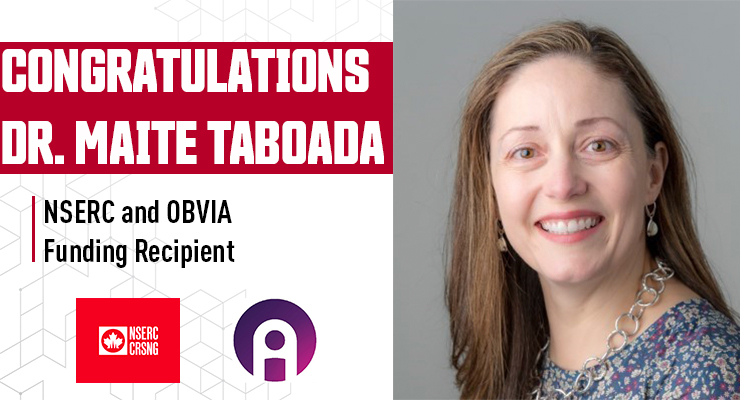
-
June 2022New funding from OBVIA to carry out research on women representation in Québec media during the Covid-19 pandemic. I'm looking forward to a collaboration with colleagues at Université Laval!
Mind the Gap: représentation des #femmes dans les #médias québécois durant la #pandémie #COVID19
— OBVIA (@ObservatoireIA) June 16, 2022
Chercheur principal: Richard Khoury @universitelaval
Cochercheuses et cochercheurs
Josette Brun ULaval@ColetteB ULaval@yannickdufresne ULaval@maite_taboada @sfueducation -
March 17, 2022Video podcast produced by CiTIUS (Centro Singular de Investigación en Tecnoloxías Intelixentes) where Senén Barro, Pablo Gamallo and I discuss language technology (in Spanish).
-
February 16, 2022A summary of our contributions on the Gender Gap Tracker:
1. Dashboards and code:- - Main dashboard with summary results: https://gendergaptracker.informedopinions.org/.
- - Research dashboard with text analyzer and topic modelling results: https://gendergaptracker.research.sfu.ca/
- - Code: https://github.com/sfu-discourse-lab/GenderGapTracker
- - P. Rao, L. Chambers and M. Taboada. "Three years of monitoring gender representation in the media". Blog post. November 30, 2022.
- - P. Rao, M. Taboada and S. Graydon. "What we can learn from three years of data on the gender gap in news reporting". Poynter. October 28, 2021.
- - M. Taboada "The coronavirus pandemic increased the visibility of women in the media, but it’s not all good news". The Conversation. November 25, 2020.
- - M. Taboada and F. Torabi Asr. “Tracking the gender gap in Canadian media”. The Conversation. February 3, 2019. (Translated as "Big data para analizar la brecha de género en la prensa".)
-
3. Academic
papers:
- - Rao, P. and M. Taboada (2021) Gender bias in the news: A scalable topic modelling and visualization framework. Frontiers in Artificial Intelligence – Language and Computation 4(82). doi: 10.3389/frai.2021.664737.
- - Asr, F.T., M. Mazraeh, A. Lopes, V. Gautam, J. Gonzales, P. Rao and M. Taboada (2021) The Gender Gap Tracker: Using Natural Language Processing to measure gender bias in media. PLoS ONE 16(1): e0245533.
-
October 28, 2021Op-ed on the Gender Gap Tracker and its third birthday:
- - P. Rao, M. Taboada and S. Graydon. "What we can learn from three years of data on the gender gap in news reporting". Poynter. October 28, 2021.
-
October 6, 2021Op-ed on online toxicity, in Policy Options, the digital magazine of the Institute for Research on Public Policy:
- - M. Taboada. "The banality of online toxicity". Policy Options. October 6, 2021.
-
September 7, 2021Op-ed on the language of fake news, in Items, the journal of the Social Sciences Research Council:
- - M. Taboada. “Authentic language in fake news”. Items – Insights from the Social Sciences. September 7, 2021.
-
August 2021Our paper received the Test of Time Award from the Association from Computational Linguistics!!!
The paper: Taboada, M., J. Brooke, M. Tofiloski, K. Voll and M. Stede (2011) Lexicon-Based Methods for Sentiment Analysis. Computational Linguistics 37 (2): 267-307.
The Test of Time Award recognizes "papers that have had long-lasting influence on the field of Natural Language Processing and Computational Linguistics."

Citation, from the video of the award ceremony: “This paper shows how a lexicon-based approach can be effective for sentiment analysis, and more importantly, also stable and portable across domains. Despite the current dominance of learning-based methods, lexicon-based methods for sentiment analysis keep being relevant, particularly in new domains where large training data isn’t available and where portability is crucial.”
-
June 2021An update on our project about online news comments. Three more papers (#8, #9, and #10 below) on news comments and a summary of our findings:
- Raw data
- - Kolhatkar, V., H. Wu, L. Cavasso, E. Francis, K. Shukla and M. Taboada (2018) The SFU Opinion and Comments Corpus: A corpus for the analysis of online news comments. Simon Fraser University.
- - GitHub page, with link to download the corpus: https://github.com/sfu-discourse-lab/SOCC
- Paper describing
the raw data (with
small annotations)
- - Kolhatkar, V., H. Wu, L. Cavasso, E. Francis, K. Shukla and M. Taboada (2020) The SFU Opinion and Comments Corpus: A corpus for the analysis of online news comments. Corpus Pragmatics 4: 155–190.
- Annotated data
(12,000 comments),
in collaboration
with Jigsaw
- - Kolhatkar, V., Thain, N., Sorensen, J., Dixon, L., Taboada, M., 2020. C3: The Constructive Comments Corpus. Jigsaw and Simon Fraser University. Dataset. DOI: 10.25314/ea49062a-5cf6-4403-9918-539e15fd7b52.
- Paper describing
the large-scale
annotation
- - Kolhatkar, V., N. Thain, J. Sorensen, L. Dixon and M. Taboada (to appear) Classifying constructive comments. First Monday. Available on arXiv: https://arxiv.org/abs/2004.05476.
- Register
analysis: Are news
comments like
conversations?
(tl;dr: NO)
- - Ehret, K. and M. Taboada (2020) Are online news comments like face-to-face conversation? A multi-dimensional analysis of an emerging register. Register Studies 2(1): 1-36.
- Subjectivity
analysis: How
complex are news
comments vs.
opinion articles?
(tl;dr: it's
complex)
- - Ehret, K. and M. Taboada (2021) The interplay of complexity and subjectivity in opinionated discourse. Discourse Studies 23(2): 141-165.
- Constructiveness
and toxicity
across 3
newspapers:
- - Op-ed. Gautam, V. and M. Taboada. 2019. “Hey Tyee commenters! Scholars studied you. Here's what they found”. The Tyee.
- NEW!!!
Register analysis,
again. If not like
conversation, what
are comments like?
(Answer: a hybrid
register):
- - Ehret, K. and M. Taboada (2021) Characterising online news comments: A multi-dimensional cruise through online registers. Frontiers in Artificial Intelligence – Language and Computation 4(79): 10.3389/frai.2021.643770.
- NEW!!!
Appraisal
analysis. Comments
are very negative.
They tend to
express evaluation
as Judgement or
Appreciation
(rather than
Affect).
- - Cavasso, L. and M. Taboada (2021) A corpus analysis of online news comments using the Appraisal framework. Journal of Corpora and Discourse Studies 4: 1-38.
- NEW!!! Concessive
relations in
comments.
Concessions have
an interpersonal
function and are
used for
evaluation and
argumentation,
especially in
constructive
comments.
- - Gómez-González, MLA and M. Taboada (2021) Concession strategies in online newspaper comments. Journal of Pragmatics 174: 96-116.
- Raw data
-
May 2021
Paper with Luca Cavasso on online news comments
— Maite Taboada (@maite_taboada) May 6, 2021
Cavasso, L., & Taboada, M. (2021). A corpus analysis of online news comments using the Appraisal framework. Journal of Corpora and Discourse Studies, 4, 1–38. DOI: https://t.co/eqbgAg95eP https://t.co/l0ZykSrwFW
Findings, 1/6 -
January 29, 2021Gender Gap Tracker paper now published:
- Asr, F.T., M. Mazraeh, A. Lopes, V. Gautam, J. Gonzales, P. Rao and M. Taboada (2021) The Gender Gap Tracker: Using Natural Language Processing to measure gender bias in media. PLoS ONE 16(1): e0245533.
Our findings:
- In 2 years of Canadian news media, the percentage of women quoted is regularly below 30%
- Women authors quote more women
- Politicians dominate in the news
- NLP
can help us find
these patterns
in data
Paper on the #GenderGapTracker in @PLOSONE with the fab team in the Discourse Processing Lab:@drftasr @MohMaz_ @aleaugusto_ti @VasundharaNLP Junette Gonzales @tech_optimist @InformedOps @SFULinguistics @SFUResearch @SFUhttps://t.co/l4nLP1sdSm
— Maite Taboada (@maite_taboada) January 29, 2021
-
January 8, 2021We have been working for almost 3 years now on a project analyzing the gender gap in Canadian media. We have created a summary dashboard with overall statistics and a research dashboard analyzing topics and top-quoted sources. We can also now share the great news that a research paper on the Gender Gap Tracker has been accepted for publication:
- Asr, F.T., M. Mazraeh, A. Lopes, V. Gautam, J. Gonzales, P. Rao and M. Taboada (to appear) The Gender Gap Tracker: Using Natural Language Processing to measure gender bias in media. PLoS ONE. -
November 25, 2020Op-ed on women quoted during COVID-19:
- The coronavirus pandemic increased the visibility of women in the media, but it’s not all good news. The Conversation. November 25, 2020. -
November 3, 2020Op-ed by Lucas Chambers and Maite Taboada on media coverage of elections:
- Who is quoted and who is elected? Media coverage of political candidates. Canadian Science Policy Centre. November 3, 2020. -
September 2020The lab has been busy analyzing online news comments. Here, all in one place, are the papers and the data that we have produced:
- Raw data
- - Kolhatkar, V., H. Wu, L. Cavasso, E. Francis, K. Shukla and M. Taboada (2018) The SFU Opinion and Comments Corpus: A corpus for the analysis of online news comments. Simon Fraser University.
- - GitHub page, with link to download the corpus: https://github.com/sfu-discourse-lab/SOCC
- Paper describing
the raw data (with
small annotations)
- - Kolhatkar, V., H. Wu, L. Cavasso, E. Francis, K. Shukla and M. Taboada (2020) The SFU Opinion and Comments Corpus: A corpus for the analysis of online news comments. Corpus Pragmatics 4: 155–190.
- Annotated data
(12,000 comments),
in collaboration
with Jigsaw
- - Kolhatkar, V., Thain, N., Sorensen, J., Dixon, L., Taboada, M., 2020. C3: The Constructive Comments Corpus. Jigsaw and Simon Fraser University. Dataset. DOI: 10.25314/ea49062a-5cf6-4403-9918-539e15fd7b52.
- Paper describing
the large-scale
annotation
- - Kolhatkar, V., N. Thain, J. Sorensen, L. Dixon and M. Taboada (to appear) Classifying constructive comments. First Monday. Available on arXiv: https://arxiv.org/abs/2004.05476.
- Register
analysis: Are news
comments like
conversations?
(tl;dr: NO)
- - Ehret, K. and M. Taboada (2020) Are online news comments like face-to-face conversation? A multi-dimensional analysis of an emerging register. Register Studies 2(1): 1-36.
- Subjectivity
analysis: How
complex are news
comments vs.
opinion articles?
(tl;dr: it's
complex)
- - Ehret, K. and M. Taboada (to appear) The interplay of complexity and subjectivity in opinionated discourse. Discourse Studies.
- Constructiveness
and toxicity
across 3
newspapers:
- - Op-ed. Gautam, V. and M. Taboada. 2019. “Hey Tyee commenters! Scholars studied you. Here's what they found”. The Tyee.
- Raw data
-
March 2020Discourse Lab member Fatemeh Torabi Asr just won the SFU President’s Emerging Thought Leader Newsmaker of the Year Award for 2019!
You can read the SFU press release about her award, and the story she wrote about her research on misinformation and fake news, which has reached almost 69,000 reads. -
March 2020Presentation at the Women in Data Science Conference in Vancouver, discussing the Gender Gap Tracker.
@maite_taboada talking about the Gender Gap Tracker right now at #WiDSVAN2020!!!#WiDSVancouver @WiDS_Conference@InformedOps @ShariGraydon @SFULinguistics @SFU pic.twitter.com/UGO8G4ZRhv
— vasundhara 👩💻🗣️🦆🏳️🌈 (@VasundharaNLP) March 5, 2020 -
February 2020I am part of a project funded by the Canada-UK Artificial Intelligence Initiative to study and counter abusive language online, with Wendy Chun of SFU as PI.
-
February 2020I wrote a column for the newsletter of the Spanish Association for Corpus Linguistics. I argue that much of corpus linguistics can be thought of as 'research for good'.
-
January 2020I am Acting Associate Dean, Research & International in the Faculty of Arts and Social Sciences.
-
December 2019Featured on the WWEST "Best of the WWest" podcast
-
November 2019We analyzed more than 1.5 million comments from 3 news organizations. We found more constructive comments than we expected, that toxicity happens equally across topics and that some news outlets have better commenters than others. The full story:
- Gautam, V. and M. Taboada (2019) Constructiveness and Toxicity in Online News Comments. Report. Simon Fraser University. November 2019.
- Gautam, V. and M. Taboada. Hey Tyee Commenters! Scholars Studied You. Here's What They Found. The Tyee (online). November 6, 2019.
We also published a short version as an op-ed for The Tyee: -
November 2019SOCC, the SFU Opinion and Comments Corpus, has been available online for a while. Now the paper describing it is also online:
- Kolhatkar, V.,H. Wu, L. Cavasso, E. Francis, K. Shukla and M. Taboada (to appear) The SFU Opinion and Comments Corpus: A corpus for the analysis of online news comments. Corpus Pragmatics. -
September 2019Our paper on writing-intensive instruction in linguistics classes is now out! Available for free:
- Pappas, P., M. Taboada and K. Alexander (2019) Teaching linguistic argumentation through a writing-intensive approach. Language (Teaching Linguistics Section) 95(3): e339-e363. -
September 2019I am participating in a project that studies online abuse against candidates in the 2019 Canadian federal election:
- Trolls on the Campaign Trail: How Candidates Experience and Respond to Online Abuse
PIs: Heidi Tworek, Chris Tenove, University of British Columbia
-
August 2019Discourse Processing Lab postdoc Fatemeh Torabi Asr publishes an article on the lab's fake news research.
- Discussed in this Guardian article.
- Reprinted by PBS, by Nieman Lab, by Salon, by AlterNet, by The Halifax Chronicle Herald. -
June 2019You can hear me discuss the Gender Gap Tracker in Spanish, gracias a Radio Canadá Internacional.
Or read the article in The Conversation España. -
June 2019The Peak, SFU's newspaper, wrote an article about the Congress of the Humanities and Social Sciences that mentions my poster presentation on work with Rada Trnavac and Cliff Goddard.
-
May 2019Paper on data quality for misinformation detection now available, open access:
Asr, F.T. and M. Taboada (2019) Big data and quality data for fake news and misinformation detection. Big Data & Society. January-June 2019:1-14.
- Paper too long to read? There's a video abstract! -
March 2019We just had a paper accepted on our fake news project!
Asr, F.T. and M. Taboada (to appear) Big data and quality data for fake news and misinformation detection. Big Data & Society. -
March 2019Attending the BCTech Summit. You can check out who else will be there from SFU.
-
March 2019I'll be conferencing quite a bit in May and June:
- Plenary at the 11th International Conference on Corpus Linguistics (Valencia, Spain)
- Plenary at the 32nd Canadian AI Conference (Kingston, Ontario) -
March 2019Two presentations about joint work with colleagues during Congress in Vancouver:
- Goddard, C., M. Taboada and R. Trnavac (2019). The English [adverb-ly adjective] construction: Classification and distribution across corpora and registers. CLA, Canadian Linguistics Association.
- Ehret, K. and M. Taboada (2019) Describing registers on the web: complexity and subjectivity in online comments and opinion articles. CAAL, Canadian Association for Applied Linguistics. -
February 2019I attended the launch of the Gender Gap Tracker in Ottawa. This was a fabulous event with Maryam Monsef, Minister for Women and Gender Equality and Dr. Joy Johnson, SFU's VP Research, hosted by Shari Graydon of Informed Opinions.
The Gender Gap Tracker, developed within my lab with Informed Opinions, monitors the proportion of women and men quoted in news stories in mainstream Canadian media (in English).
We had great media coverage for this event. You can check the Conversation piece for an explanation of the tracker, and see all the other media mentions:
- Tracking the gender gap in Canadian media (The Conversation)
- Online tool gives media outlets incentive to achieve gender parity (The Toronto Star)
- SFU partners with Informed Opinions to create Gender Gap Tracker (SFU News)
- In numbers there is strength (Ottawa Citizen and Montreal Gazette)
-
January 2019A video about my research, especially on sentiment analysis.
-
November 2018First publication out of our 'fake news' project:The data challenge in misinformation detection: Source reputation vs. content veracity. Proceedings of the 1st Workshop on Fact Extraction and Verification (FEVER), Conference on Empirical Methods in Natural Language Processing. Brussels. November 2018.
-
September 2018I am Acting Associate Dean in the Faculty of Arts and Social Sciences at SFU.
-
June 2018Brief interview in a Global TV News story about IBM's new debating system.
-
May 2018
-
May 2018I did some radio interviews after my opinion piece on trolls in online news comments:
- CKNW in Vancouver, Charles Adler Tonight
- CHQR in Calgary, Calgary Today with Angela Kokott -
May 2018Article in The Conversation about our research on online news comments. Trolls, toxicity and construtive conversations.
-
May 2018The Discourse Processing Lab participated in the BCTech Summit. We did demos of two systems: content moderation and fake news detection. Pictures and links to demos on our lab page.
-
May 2018I'm part of a panel discussing the documentary The Cleaners, about content moderation in social media.
-
April 2018
-
January 2018We have just released the SFU Opinion and Comments Corpus (SOCC), and submitted a paper describing it.
-
November 2017Keynote at the BC-TEAL Regional Conference. See a summary of the conference highlights.
-
October 2017
-
October 2017SFU FASS News story: Katharina Ehret on her research in our lab.
-
September 2017Two new postdocs join the Discourse Processing Lab: Katharina Ehret and Fatemeh Torabi Asr. Welcome!
-
September 2017A few recent papers:
- Constructiveness in news comments at the Workshop on Journalism and NLP in EMNLP 2017
- Underspecification in RST, RST Workshop
- Sentiment and RST in Basque, RST Workshop
- Toxicity in video game chat, Knowledge-Based Systems
Pdfs in the publications page. -
September 2017As part of a project on evaluating rhetorical structure annotations, we have developed guidelines for annotating relations.
-
May 2017Paper accepted at the Abusive Language Online Workshop:
Kolhatkar, V. and M. Taboada (2017) Constructiveness in news comments. Proceedings of the 1st Abusive Language Online Workshop, 55th Annual Meeting of the Association for Computational Linguistics. Vancouver. August 2017. -
May 2017I'm teaching a new course in the fall: The Language of Social Media
-
Apr 2017Call for papers: Special Issue of Computational Linguistics on "Language in Social Media: Exploiting discourse and other contextual information". Deadline: October 15th, 2017.
-
Mar 2017On Being Negative: Paper with Rada Trnavac and Cliff Goddard in the new journal Corpus Pragmatics
-
Mar 2017Call for papers for the 6th Workshop on Rhetorical Structure Theory and Related Formalisms. Deadline: June 9, 2017. Please consider submitting a paper!
-
Dec 2016New website of the Discourse Processing Lab
-
Oct 2016Varada Kolhatkar joins the Discourse Processing Lab.
-
Sept 2016Plenary presentation at the International Workshop on Discourse Analysis (IWoDA)
-
Jul 2016New paper with Farah Benamara and Yannick Mathieu on sentiment analysis, beyond bags of words. To appear in Computational Linguistics. Pre-print available from my publications page.
-
Jul 2016
-
Apr 2016I am hiring a postdoc in corpus/computational linguistics.
-
Feb 2016I have created a web page and posted a template to facilitate editing tasks in Microsoft Word, especially for linguists.
-
Oct 2015I am now Associate Editor for the journal Dialogue and Discourse. Please consider submitting relevant work.
-
Sep 2015Talk at the5th Workshop on RST and Discourse Studies, part of the Conference of the Spanish NLP Society, in Alicante, Spain.
-
July 2015RST Signalling Corpus now available through the LDC.
-
July 2015Plenary at the International Systemic Functional Congress in Aachen, Germany.
-
June 2015Between July and December 2015 I will be on study leave, visiting the Department of English Philology I at the Universidad Complutense de Madrid. If you need a postal address, please get in touch. I'll check my email semi-regularly.
-
Jan 2015Plenary talk at the Conference of the COST Action TextLink: Structuring Discourse in Multilingual Europe in Louvain-la-Neuve, Belgium.